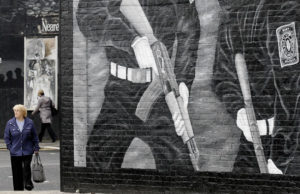
Le culture politiche separate non sono state riconciliate mentre le zone abitative e l’educazione hanno visto una profonda segregazione, ha aggiunto il Community Relations Council.
Il paramilitarismo resta una micaccia, l’accordo sulla polizia non è raggiunto, con molte reclute cattoliche che lasciano anticipatamente e non c’è una strategia per la riconciliazione o per la gestione del passato, continua il documento.
“Nessun nuovo partito politico è emerso dopo l’Accordo del Venerdì Santo del 1998 e la stabilità politica in Irlanda del Nord ha a che fare con l’equilibrio raggiunto tra i due blocchi, piuttosto che con una riconciliazione tra le due culture politiche”, ha detto.
Nelle elezioni di maggio il Democratic Unionist Party ha attirato solo il 2% dei trasferimenti dagli elettori nazionalisti e lo Sinn Fein ha ricevuto soltanto il 2,2% dei trasferimenti dagli unionisti. Entrambi i partiti hanno distanziato i rivali dell’Ulster Unionist Party ed i nazionalisti SDLP.
“Le loro traiettorie parallele adesso vengono definite meno dalle loro preferenze costituzionali e più dalle loro basi etniche” aggiunge il rapporto Northern Ireland Peace Monitoring.
“Per dirla più semplicemente, l’attrazione gravitazionale verso una voce forte in ogni comunità suggerisce che in futuro la politica in Irlanda del Nord sarà definita da un grande partito cattolico e da un grande partito protestante”.
Il Segretario di Stato per l’Irlanda del Nord Owen Paterson ha detto che non c’è consenso su come affrontare il passato, ma il primo ministro Peter Robinson ha proposto che un “archivio di storie” possa essere raccolto sul sito di Maze/Long Kesh, la prigione in cui avvennero gli scioperi della fame dell’IRA.
La relazione, tuttavia, ha evidenziato alcuni punti positivi. Ha rilevato le attività della comunità di costruzione della pace e ha detto che le istituzioni politiche sono al sicuro con tutti i cinque principali partiti disposti a lavorare all’interno di un quadro politico concordato.
Il numero di sparatorie e attentati è diminuito di oltre un quarto nel 2011, da 171 a 124, e l’Irlanda del Nord è relativamente tranquilla. Tuttavia, la recluta cattolica della PSNI Ronan Kerr è stato ucciso dai repubblicani ad Omagh, nella Contea di Tyrone, e ci sono segnali che sempre più cattolici lasciano la polizia entro cinque anni rispetto ai protestanti. La percentuale dei cattolici nella forza è ancora inferiore rispetto alla popolazione generale.
NI ‘risks lurching back into past’
Separate political cultures have not been reconciled while housing and education has seen deepening segregation, a review for the Community Relations Council added.
Paramilitarism remains a threat, the policing deal is not secure with many Catholic recruits leaving early and there has been no strategy for reconciliation or dealing with the past, the document added.
“No new political party has emerged since the 1998 Agreement and the stability of Northern Ireland politics is to do with the equilibrium achieved between the two blocs rather than any reconciliation between the two political cultures,” it said.
In the May election the Democratic Unionists attracted only 2% of transfers from nationalist voters and Sinn Fein only received 2.2% of transfers from unionists. Both parties emerged having outdistanced their rivals the Ulster Unionists and nationalist SDLP.
“Their parallel trajectories have left them defined less by their constitutional preferences and more by their ethnic bases,” the Northern Ireland Peace Monitoring report added.
“To put it more simply, the gravitational pull towards a strong voice in each community suggests that in the future Northern Ireland politics will be defined by one large Catholic party and one large Protestant party.”
Northern Ireland Secretary Owen Paterson has said no consensus exists on dealing with the past but First Minister Peter Robinson has suggested a “story-telling archive” could be established on the site of the former Maze/Long Kesh prison where the IRA hunger strikes took place.
The report, however, did highlight some positive points. It noted community peace building activities and said the political institutions are secure with all five main parties prepared to work within an agreed political framework.
The number of shootings and bombings fell by over a quarter in 2011, from 171 to 124, and Northern Ireland is relatively peaceful. However, new Catholic constable Ronan Kerr was killed by dissident republicans in Omagh, Co Tyrone, and there are signs of more Catholics than Protestants leaving the police within five years. The proportion of Catholics in the force is still lower than the general population.